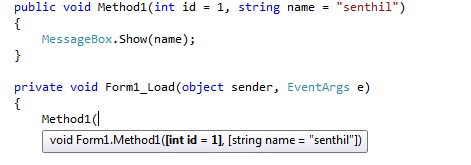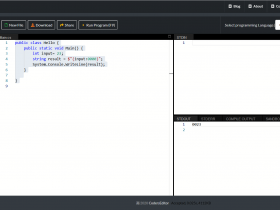C# Tips & Tricks #30 – Optional and Named Parameters
Optional parameters and named Parameters is one of the new features that was introduced in in C# 4.0. It provides the ability to define a parameter for a function with some default value.
Visual Basic was one of the languages which still has the optional parameters and this is newly introduced in C# 4.0 .
Optional and Named Parameters
When the function is invoked, we can simply decline to supply a value and use the default value instead.
public void GetEmployeeDetails(int id = 1, string name = "senthil")
{
MessageBox.Show(name);
}
private void Form1_Load(object sender, EventArgs e)
{
GetEmployeeDetails(2);
}The Method GetEmployeeDetails has a default value defined for the id and name . If we dont specify any parameters , then it will take the default value,In the above example it prints “senthil”.
C# 4.0 provides another feature “Named Parameters” that enable us to call the method with the parameters in any order .
private void Form1_Load(object sender, EventArgs e)
{
GetEmployeeDetails(name: "kumar", id: 2);
}The named parameters can work with any methods.
The other feature of this is that the Visual Studio 2010’s shows the parameter info as option with its Intellisense .
If you have 2 versions of the same method (Overloaded) , C# uses the method without the optional parameters .
Eg :
public void GetEmployeeDetails(int id, string name = "senthil")
{
MessageBox.Show(name);
}
public void GetEmployeeDetails(int id)
{
MessageBox.Show(id.ToString());
}
private void Form1_Load(object sender, EventArgs e)
{
GetEmployeeDetails(2);
}In the above example , the GetEmployeeDetails(int id) that doesn’t have a optional parameters is given preference when a call with one parameter is made .
Note : The Optional Parameters must be placed after the required parameters else the C# compiler will show a compile time error.







Leave a Review